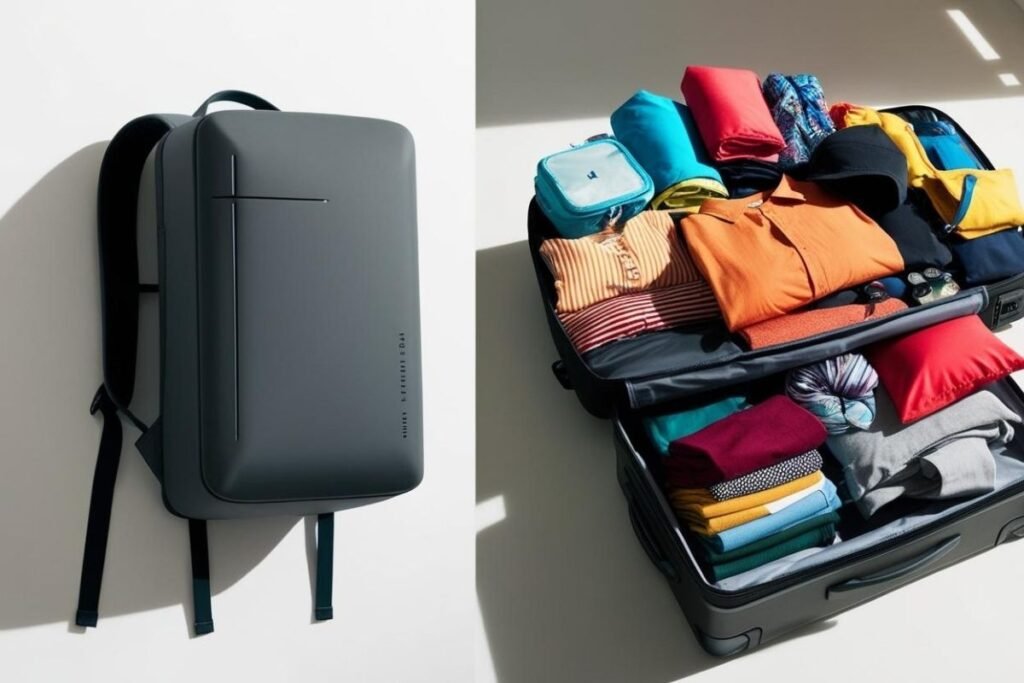
Travelling is an exciting adventure but it’s easy to make costly mistakes along the way. Even the most experienced travellers can overlook details that affect their journey. From overpacking and rigid itineraries to forgetting key essentials, these small oversights can add stress to what should be an enjoyable trip. Let’s explore the most common travel mistakes and how to avoid them for a smoother, stress-free adventure.
The Packing Dilemma
Overpacking is one of the most common mistakes travellers make. Lugging around a heavy suitcase or overstuffed backpack can be frustrating and exhausting. It limits mobility, increases baggage fees and leaves little room for souvenirs.
Instead of cramming your bag with unnecessary items, focus on:
- Versatile clothing – Choose mix-and-match outfits rather than packing an entire wardrobe.
- Lightweight essentials – Use travel-sized toiletries and avoid bulky gadgets.
- Laundry options – Many destinations offer laundry services, so you don’t need fresh clothes for every single day.
Even seasoned travellers fall into the trap of bringing “just in case” items. Stick to the essentials and enjoy the freedom of travelling light!
Are You Overplanning Your Itinerary?
Trying to see everything in a short time can turn a holiday into a stressful race. A packed itinerary often leaves no room for rest, spontaneity or those hidden gems that make travel so special.
Instead, aim for a balanced plan:
- Prioritize must-see attractions – Pick a few key highlights instead of trying to do it all.
- Leave gaps for exploration – Some of the best travel moments happen unexpectedly.
- Embrace flexibility – If you love a place, stay longer. If something isn’t as exciting as expected, move on.
Allowing for downtime and serendipitous discoveries makes your trip more enjoyable and far less overwhelming.
Table of Contents
- 1. Overpacking: Carrying More Than You Need
- 2. Overplanning: Rushing Through Your Itinerary
- 3. Booking Ethical and Sustainable Tours
- 4. Eating at Chain Restaurants Instead of Local Cuisine
- 5. Not Trusting Your Instincts
- 6. Ignoring Local Culture and Customs
- 7. Skipping Travel Insurance
- 8. Ignoring Budget Constraints
- 9. Skipping Local Advice
- 10. Not Making Copies of Important Documents
- 11. Not Checking Mobile Roaming Charges
- 12. Avoiding Public Transport
- 13. Not Staying Hydrated
- 14. Not Learning Basic Local Phrases
- 15. Forgetting to Relax
- Final Thoughts
15 Common Travel Mistakes and How to Avoid Them
Travelling soon? Avoid these common missteps!
Travel is a mix of excitement, adventure and discovery but even the most experienced travellers make mistakes that can impact their trip. Some errors might be minor inconveniences, while others can lead to unnecessary stress, financial loss or missed experiences.
To ensure your next journey is as smooth and enjoyable as possible, here are 15 common travel mistakes and how you can avoid them.
1. Overpacking: Carrying More Than You Need

It’s tempting to pack for every possible situation but dragging around a heavy suitcase or oversized backpack can quickly take the joy out of travel. Overpacking often leads to excess baggage fees, makes public transport a hassle and leaves you with little space to bring home souvenirs. Beyond the physical strain, it can also add unnecessary stress as you struggle to keep track of too many belongings.
How to Avoid It:
- Pack versatile clothing that can be mixed and matched into multiple outfits.
- Use packing cubes to stay organised and reduce bulk.
- Check for laundry services at your accommodation so you can re-wear clothes instead of bringing extras.
Travelling light not only saves you money and effort but also gives you the freedom to move easily and enjoy your journey without feeling weighed down.
2. Overplanning: Rushing Through Your Itinerary
It’s natural to want to see and do as much as possible but cramming every hour of your trip can quickly turn into burnout. A packed schedule often leaves no room for rest, spontaneous adventures or stumbling across those hidden gems that make travel truly memorable. Instead of enjoying the moment, you may find yourself watching the clock and racing from one attraction to the next.
How to Avoid It:
- Plan key highlights but leave flexibility in your schedule.
- Give yourself downtime between activities to relax and recharge.
- Stay open to unplanned discoveries—they often become the best stories of your trip.
Building in space for surprises not only eases stress but also allows you to connect more deeply with the places and people you encounter.
3. Booking Ethical and Sustainable Tours
The tours you choose have a lasting impact on the places you visit. Unfortunately, not all operators support the local environment or communities. Some may exploit animals, damage fragile ecosystems, or funnel profits away from the people who live there. Choosing responsibly not only protects destinations but also ensures your money contributes to positive change.
How to Avoid It:
- Research tour operators that prioritise sustainability and ethical tourism.
- Choose experiences that support local guides and small businesses.
- Avoid tours involving unethical animal interactions, such as riding elephants or posing with drugged wildlife.
Travelling ethically helps preserve the very cultures and landscapes you came to experience—and creates a more authentic connection with the people who call these places home.
4. Eating at Chain Restaurants Instead of Local Cuisine

When you stick to familiar fast-food chains, you miss out on the chance to discover the authentic flavours of a destination. Food is often at the heart of culture and eating locally can turn an ordinary trip into a memorable culinary adventure. From street food stalls buzzing with energy to quiet family-run eateries, these are the places where stories are told through recipes passed down for generations.
How to Avoid It:
- Research highly rated local eateries before your trip.
- Visit food markets or family-owned restaurants for a true taste of place.
- Be adventurous—local dishes often become the highlights of your journey.
By stepping outside your comfort zone, you’ll not only enjoy better meals but also support the local economy and gain a deeper appreciation of the culture.
5. Not Trusting Your Instincts
Your gut feelings are often your best travel companion. Ignoring them can sometimes put you in uncomfortable or even unsafe situations. Maybe it’s a taxi driver who seems suspicious, a street that feels deserted after dark or a deal that looks too good to be true—if something doesn’t feel right, it usually isn’t.
How to Avoid It:
- Trust your instincts—remove yourself from any situation that feels off.
- Follow local safety advice and stay alert to your surroundings.
- Don’t hesitate to change plans if it helps you feel safer or more at ease.
Listening to that inner voice might mean missing one experience but it could save your trip from turning into a stressful memory.
6. Ignoring Local Culture and Customs

Every destination has its own traditions, values and social norms and overlooking them can lead to awkward encounters or worse, offending the very people you came to meet. Something as simple as wearing shoes inside a home, dressing inappropriately at a sacred site, or misunderstanding local etiquette can create unnecessary friction. Respecting culture isn’t just polite—it opens the door to more meaningful connections with locals.
How to Avoid It:
- Research cultural norms before you arrive.
- Dress appropriately, especially in religious or sacred spaces.
- Learn basic etiquette, such as greetings or gestures that carry cultural meaning.
When you take the time to honour local traditions, you show respect and are often rewarded with warmer hospitality and richer travel experiences.
7. Skipping Travel Insurance
It’s easy to see travel insurance as an extra cost you can do without—until you actually need it. From lost luggage to delayed flights or unexpected medical emergencies, travel mishaps can happen to anyone, anywhere. Without coverage, you could be left with hefty bills, disrupted plans and a lot of unnecessary stress.
How to Avoid It:
- Invest in reliable travel insurance that covers health, cancellations and theft.
- Read the fine print to understand exactly what’s included.
- Keep digital and paper copies of your policy handy during your trip.
Having insurance provides more than financial protection—it offers peace of mind, letting you focus on enjoying your journey instead of worrying about what-ifs.
8. Ignoring Budget Constraints
It’s easy to get carried away in the excitement of travel but overspending early on can create financial stress later in the trip. Blowing your budget in the first few days may force you to cut back on experiences you truly care about—or worse, leave you scrambling for cash when you need it most.
How to Avoid It:
- Set a daily budget and track your expenses to stay on target.
- Prioritise experiences that matter most instead of splurging on impulse buys.
- Leave room for surprises—budgeting a little extra ensures you won’t feel restricted if something amazing comes up.
Managing your money wisely means you can enjoy the journey fully without constant worry about what’s left in your wallet.
9. Skipping Local Advice

Guidebooks and travel blogs are helpful but sometimes the best tips come directly from locals. From secret beaches and hidden cafés to shortcuts only residents know, local knowledge can transform an ordinary trip into something unforgettable. Ignoring these opportunities often means missing out on authentic experiences that tourists rarely find.
How to Avoid It:
- Ask locals for recommendations on food, activities and sightseeing.
- Be open to non-touristy spots, even if they’re not in your guidebook.
- Use small talk with shopkeepers, drivers or hosts—they often love sharing insider gems.
By listening to locals, you’ll gain a richer understanding of the culture and discover places that make your trip feel truly unique.
10. Not Making Copies of Important Documents
Few things derail a trip faster than losing your passport, visa papers or other essential travel documents. Replacing them abroad can be stressful, expensive and time-consuming. Having backup copies gives you a safety net and speeds up the process if the originals are lost or stolen.
How to Avoid It:
- Carry both digital and physical copies of key documents like your passport, visas and travel insurance.
- Store extra copies in a separate bag or with a trusted travel companion.
- Save secure backups online (such as cloud storage) so you can access them anytime.
This small step can save you from a major travel nightmare.
11. Not Checking Mobile Roaming Charges
Using your phone abroad without a plan can result in shockingly high bills. Roaming charges for data, calls and texts add up quickly, especially if you’re relying on maps, translations, or video calls to stay connected.
How to Avoid It:
- Research international roaming plans or buy a local SIM card.
- Use free Wi-Fi at cafés, hotels or public spaces whenever possible.
- Consider an eSIM service for flexibility and better rates across multiple countries.
Staying connected is important but with a little planning, you can avoid unnecessary costs and still use your phone stress-free.
12. Avoiding Public Transport

Many travellers default to taxis or private cars but these can quickly drain your budget. Public transport, on the other hand, is not only cheaper but also offers a more authentic glimpse into daily life. Riding the metro in a bustling city or hopping on a local bus can give you experiences no private ride ever will.
How to Avoid It:
- Learn how to use the local metro, buses or train systems before you arrive.
- Research transport passes designed for tourists—they often save both money and time.
- Observe locals—following their lead helps you navigate new systems with confidence.
Embracing public transport adds depth to your journey and keeps costs down while immersing you in the local rhythm of life.
13. Not Staying Hydrated
It’s easy to overlook water intake when you’re caught up in exploring but dehydration can lead to fatigue, headaches or worse health issues—especially in hot climates or at high altitudes. Staying hydrated keeps your energy up so you can fully enjoy your adventures.
How to Avoid It:
- Carry a refillable water bottle and top it up throughout the day.
- Drink regularly, even if you don’t feel thirsty.
- Use water purification tablets or filters if travelling somewhere with unsafe tap water.
A simple habit like drinking enough water can make the difference between powering through your day or cutting it short from exhaustion.
14. Not Learning Basic Local Phrases
Language is a powerful bridge. Even a simple “Hello” or “Thank you” in the local language can make a big difference in how you’re received. Locals often appreciate the effort, and those small words can open doors to warmer interactions, smoother transactions and a deeper sense of connection. Relying only on English can sometimes create distance or misunderstandings.
How to Avoid It:
- Learn a few key phrases like “Thank you,” “Please,” “How much?” and “Where is…?” before you go.
- Use translation apps or phrasebooks when you need extra help.
- Practice pronunciation—even imperfect attempts usually earn a smile.
Making the effort shows respect and can turn everyday encounters into meaningful moments.
15. Forgetting to Relax

Travel is meant to be enjoyable but cramming too much into your itinerary can make it feel like work instead of adventure. Constantly rushing from one activity to the next leaves little time to soak in the atmosphere, reflect or simply enjoy being in the moment. Sometimes, the best memories are created when you slow down.
How to Avoid It:
- Take time to unwind—enjoy a coffee in a local café, read a book in the park or watch the world go by.
- Schedule free days with no fixed plans to recharge your energy.
- Balance activities so that sightseeing doesn’t come at the cost of rest.
Remember: it’s your trip, not a checklist. Giving yourself space to relax makes the journey more enjoyable and the memories far sweeter.
Final Thoughts
Travelling is a journey of discovery, adventure, and fun. But even the most seasoned travellers make mistakes from time to time. By recognising these common missteps and taking a few simple steps to avoid them, you can make your trips smoother, safer, and more enjoyable.
Safe travels—and always keep an eye out for those little details that turn an ordinary trip into something truly unforgettable.
🌍 Travel Planning Resources
These are the tools we personally use and trust when planning our travels from finding a place to stay to booking activities, transport and insurance. Let your Tohu guide you — Trust the Journey and follow what feels right for you.
- ✈️Flights – Compare great deals with Trip.com then Kiwi.com for flexible, affordable options.
- 🚐 Campervans – Compare rental deals with Motorhome Republic across Aotearoa and beyond.
- 🛏️ Stays – Compare hotels on Trip.com and TripAdvisor or Booking.com.
- 🚐 Rental Cars – Compare prices and book through Airport Rentals by Motorhome Republic for trusted brands and easy airport pickup.
- 🎟️ Activities – Browse tours and experiences on Viator, Get Your Guide, or TripAdvisor
- 🚆12Go Asia – Compare and book trains, buses, and ferries across Asia in one place with 12Go.
- 🛡️ Travel Insurance – Get flexible short-term coverage with Insubuy for your next holiday.
- 🔒 Protect Your Privacy with a VPN – We recommend Surfshark VPN for secure and private browsing while travelling. It’s fast, affordable and works worldwide — perfect for public Wi-Fi at airports, cafes and hotels.
- 📱 Travel eSIM – Stay connected with Airalo
- 💼 Lounge Access – Treat yourself with Priority Pass – for UK or US
- 🎶 Events & Concerts – Book tickets worldwide through Ticketmaster.
🧭 Note: Some booking links can be a bit shy when you’re using a VPN. If one doesn’t open, try pausing your VPN or switching to a different server location or secure Wi-Fi network to get things flowing again.
“The real voyage of discovery consists not in seeking new landscapes, but in having new eyes.” – Marcel Proust